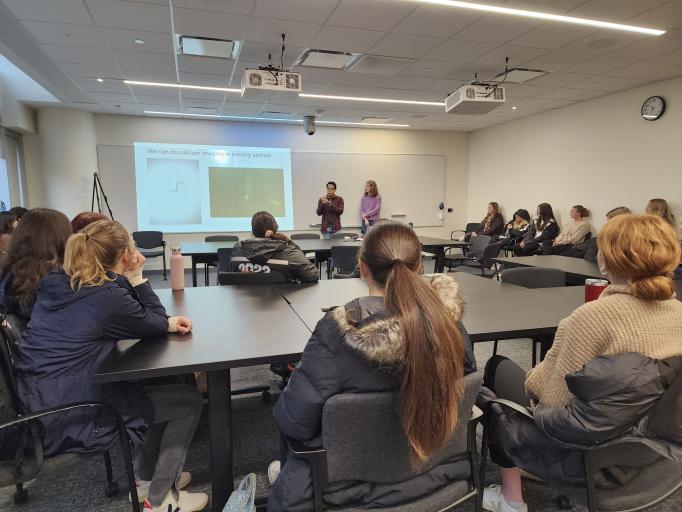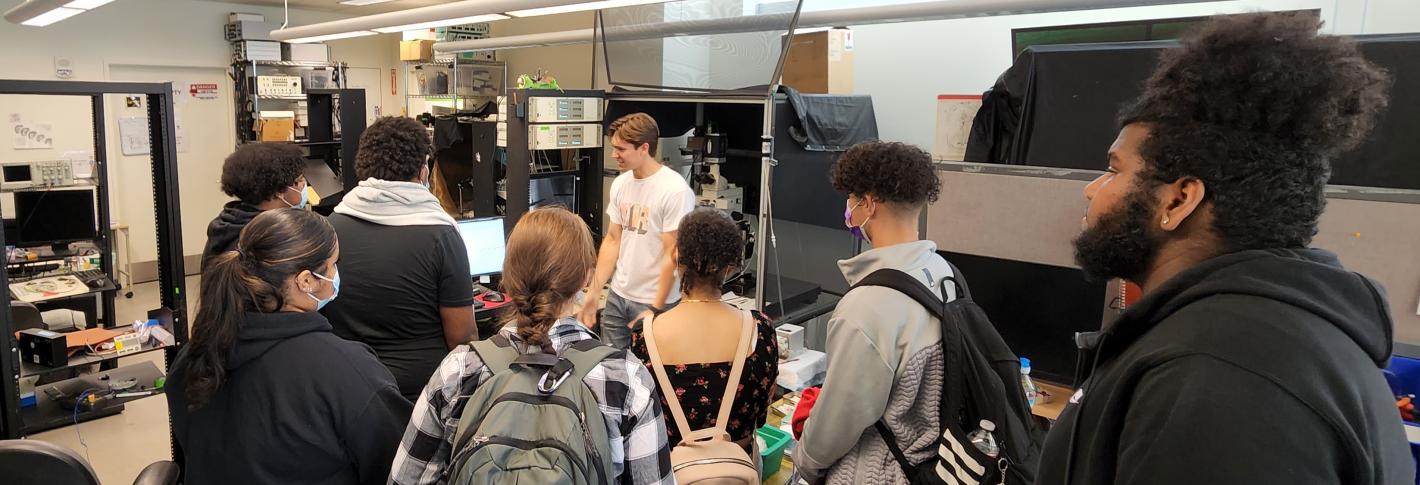Welcoming Ways
We believe in the power of science, not only to tell us about the nature of the brain in health and disease, but also to unify people. We are proud to be a community of scientists, students and staff from all over the country and the world who are joined by a shared determination to drive neuroscience discovery and innovation forward.
Taking inspiration from the brain itself, where many different types of cells work together to produce amazing neurological functions and intellectual abilities, we welcome every person who has passion and talent to contribute in our labs. We value open opportunity and mutual respect for all. Here we thrive as many individuals working, learning, caring, and discovering…together.
Outreach programs
The Picower Institute and partners at MIT (including the Departments of Biology and Brain and Cognitive Sciences), offer several programs through which young scholars from a broad range of backgrounds can attain extra research experience and training. These programs serve students at three levels:
More opportunities
FYI, we also have fellowship programs for people interested in graduate study, and at the postdoctoral or clinical levels
Research Scholars Program (post-baccalaureate)
The Research Scholars Program (RSP), is a post-baccalaureate opportunity hosted in our Brain and Cognitive Sciences (BCS) complex at MIT. The program is designed to provide outstanding recent college graduates from disadvantaged backgrounds with additional academic training, as they earn a full graduate-level stipend, to become competitive PhD applicants. Since 2017 several Picower Labs have hosted participants in the RSP.
Undergraduate Research Opportunities
MIT Summer Research Program - BIO
Every summer through the MIT Summer Research Program (MSRP-BIO), undergraduates from underserved or disadvantaged backgrounds attending non-research intensive colleges can apply to join our labs to engage in current research. For example, in 2021 we hosted 11 students from the Caribbean to California who did amazing things with the opportunity.
Importantly, students often go on from their MSRP-BIO experience to advanced studies. Learn more about the program's outcomes through the stories of three MSRP-BIO alumnae who are now all graduate students in Emery Bronwn's lab here at MIT.
FULL STORY ON MSRP-BIO OUTCOMES
Quantitative Methods Workshop
An intensive seven-day workshop offered in early January. The workshop is limited to 35 undergraduate participants from a selected number of partner institutions. Although registration is by invitation only, a popular version of the experience is also available online through EdX.. What you'll learn:
- Apply quantitative methods to biological problems
- Define computational vocabulary
- Write Python, MATLAB, and R code to analyze biological data
- Examine any protein structure in PyMOL
- Analyze how to answer a scientific question through a step-by-step thought process.
High School Programs & Tours
The Picower Institute for Learning and Memory periodically welcomes high school groups to tour labs and learn about neuroscience from presentations by researchers.To learn more and to discuss a tour, contact Mandana Sassanfar, Director of Diversity and Science Outreach in Biology and Brain and Cognitive Sciences,
Feature story about H.S. summer internships
Leah Knox Scholars Program
A two-year program in MIT's Department of Biology with hands-on lab experience and mentorship for low-income high school students providing a foundation for science education in college and beyond.
Learn More about Knox Scholars
Spring Break, 2023
Students from high schools in Everett, Lawrence and Wellesley toured Picower Institute labs and heard a talk from Picower Institute Assistant Professor Brady Weissbourd during MIT's spring break.
Read the Story
Everett and Lawrence High Schools, 2022
Just before school was out for summer, high school students from Everett and Lawrence toured several Picower labs and other life sciences research venues at MIT to get information and inspiration.
Top of page: A group of students from Lawrence High School listen to Bear Lab graduate student Max Heinrich describe his autism research (white tee shirt).
Read the Story
Masconnet High School, 2022
On Dec. 16 about 30 seniors in the Masconomet High School psychology club stopped by The Picower Institute on a visit to MIT that also included the Koch and Broad Institutes. Graduate student Talya Kramer and post-baccalaureate researcher Eric Bueno of the Flavell Lab explained how the lab's research in the model organism of the nematode worm has revealed fundamental workings of nervous systems. They also traced their paths from college into research training and careers.

Students from Masconomet High School learn about neuroscience from Talya Kramer and Eric Bueno


